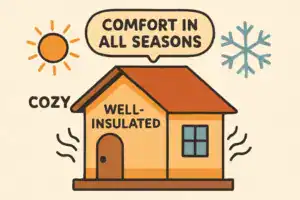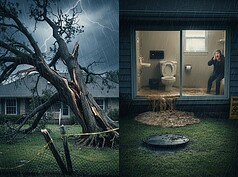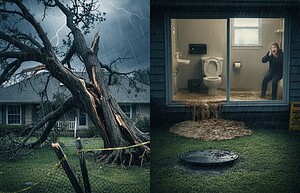Prioritizing insulation is crucial for reducing energy expenses and enhancing property value. It provides immediate comfort improvements and lasting economic and conservation advantages, and it is felt throughout the season.
Insulation is a wise investment for homeowners, providing daily comfort and financial benefits. As energy prices rise, it shields against elements, making rooms cozier and quieter, and reducing energy bills. Professional insulation services play a pivotal role in ensuring your home stays protected from temperature extremes, persistent drafts, and rapidly increasing utility costs. Additionally, by minimizing overall energy consumption, homeowners contribute to a greener, more sustainable future.
Enhancing Home Comfort
Insulation is crucial for a comfortable, draft-free home. It acts as a thermal barrier to prevent warm air from escaping and hot outdoor air from infiltrating. It reduces cold floors, chilly corners, and stuffy rooms and can reduce heat loss by up to 25%. It also dampens external noise, minimizes mold and mildew risks, and enhances indoor air quality. Over time, effective insulation contributes to significant energy savings and lowers utility bills. Upgrading or adding insulation is a practical investment that supports both comfort and long-term home efficiency.

Achieving Energy Savings
Insulated homes are energy-efficient, reducing the workload for heating and cooling systems. Targeted upgrades in vulnerable areas like attics, exterior walls, and basement rim joists can reduce annual utility bills by up to 15%. Extreme hot or cold zones see the most significant savings. Professional insulation upgrades require an upfront investment, but the long-term cost benefits include reduced monthly energy bills, which can add up to hundreds or thousands of dollars over time. Insulation is a smart, multipurpose step towards property value enhancement and responsible financial planning.
Environmental Impact
Insulated homes save kilowatt-hours, reducing fuel consumption and emissions. This reduces the carbon footprint and contributes to climate change efforts. A properly insulated home can prevent 1,700 kg of carbon dioxide emissions annually. Investing in insulation is a smart economic choice and a responsible stewardship act. Energy-efficient homes are valued for their resilience, contributing to a sustainable future and positively impacting the planet and future generations.
Increasing Property Value
Homebuyers today prioritize energy efficiency and comfort in their property search. Modern insulation-equipped homes offer lower operating costs and a more enjoyable living experience, commanding higher prices and less time on the market. Insulation projects are highly profitable for return on investment, with sellers recovering up to 80-90% of installation costs at resale. Superior insulation enhances curb appeal and market desirability, reducing mold and mildew risks.
Choosing the Right Insulation
Insulation solutions vary based on a home’s age, climate, insulation levels, and specific areas. Options include fiberglass batts, cellulose, rigid foam boards, and spray foam. Consulting with trusted insulation services ensures expert guidance and meets local codes. Professional installation involves a comprehensive property assessment, identifying air gaps and thermal leaks. Prioritizing solutions based on need and return on investment ensures long-term comfort, value, and efficiency. Proper insulation planning can also improve indoor humidity control and reduce strain on HVAC systems, promoting healthier and more stable living conditions.







